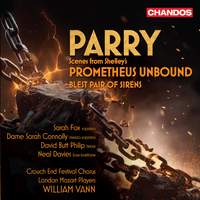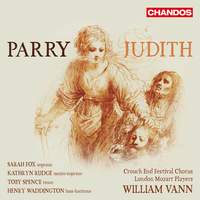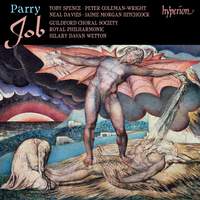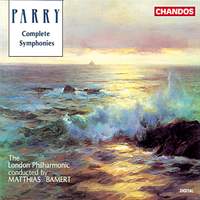Interview,
William Vann on Parry's Prometheus Unbound
Released on Chandos a couple of weeks ago, the work's first outing on disc is Recording of the Month in the October edition of Gramophone, and features Neal Davies in the title-role alongside Sarah Fox, Sarah Connolly and David Butt Philip. The morning after the launch of the album (which took place at The Royal Hospital Chelsea, where Vann is Organist & Director of Music) we sat down to discuss the piece's genesis and reception, its role in the composer's development as an orchestrator, Parry's progressive politics, and why the time is ripe for a reassessment of his major works...
You’ve made it a bit of a mission to champion Parry’s large-scale works over the past few years: what was the catalyst?
When I was a kid singing in church choirs I’d often see that line in the hymnbook next to Dear Lord and Father of Mankind: ‘Tune: Repton, from the oratorio Judith by Parry.’ Every now and again it would pop back into my head as an adult, and I’d think ‘What is this oratorio, and why have I never heard of anyone performing it?’.
Eventually I did a bit of research and I found out that there was a performance happening in Toronto to mark the centenary of Parry’s death in 2018; some Canadian scholars, under conductor Stephanie Martin, had reconstructed the lost parts from the full score in the Royal College of Music library. I dropped them an email explaining that I wanted to do the piece in London and possibly record it, and the whole team was really helpful: they gave me a lot of their resources, and some of them came all the way to London for the performance of Judith we did at Royal Festival Hall!
As I got more invested in the project, I started reading Jeremy Dibble’s biography of Parry and got in touch with him - when you’re embarking on something like this you want to make sure that nobody else had had the same idea at the same time, and I knew if there was one person who would have heard it any rumours to that effect it would be Jeremy!
It’s Jeremy’s life’s ambition to get this music heard, and he pointed me in the direction of various new things: one was a Stanford oratorio called Eden which is also basically unknown, and another was Prometheus. Interestingly, Jeremy doesn’t massively back it as a piece in his biography of Parry – partly because the one performance he heard in 1980 didn’t completely grip him. But when you hear something for the first time, do you appreciate everything in it? Probably not. It takes a while to get to know a piece, and I remember him turning to me after one of our recording-sessions and saying ‘Gosh, I’m going to have to reassess what I wrote thirty years ago!’. A bit of reassessment is due for Parry in general, I think…
How was the piece received at its premiere?
Certainly the initial reaction was mixed: I think some people just didn’t really get what Parry was trying to do, and found it all a bit impenetrable. The oratorio tradition in England at the time was very much dominated by Handel and Mendelssohn, and this is totally different: it’s a breath of fresh air which seems to have excited and perplexed people in equal measure.
The first performance apparently wasn’t great, and that’s a real shame - but so many pieces of music had rocky starts and still survived! As Jeremy points out, the choral ‘scores’ consisted of single vocal lines rather than all of the parts, and they didn’t really have enough rehearsal-time: in fact the evening before, Parry made them rehearse right into the night because it needed so much more work!
The big performance which Stanford conducted in Cambridge the following year seems to have gone much more smoothly and it got a few more outings on the back of that, but then it just seems to have faded very quickly out of the repertoire… There are so many pieces like that in history: if you look at the back of second-hand oratorio scores you see these astonishing lists of composers (let alone pieces!) you’ve never even heard of, which were obviously very popular when they were published. Probably not all of them are anywhere near the quality of Prometheus, though: this is really great music, and if it wasn’t for that I honestly wouldn’t have bothered!
This is one of Parry’s first major works with orchestra - is there a sense of him finding his feet as an orchestrator?
I won’t call it juvenilia, but it’s fair to say it’s his first mature piece. You can certainly tell that he’s fresh from listening to a lot of Wagner, but given we’re in the 1880s that’s hardly a surprise! And that isn’t the whole story: even though Prometheus is really his first mature work, you can already hear the beginnings of Parry developing his own distinctive voice.
His orchestration’s really exciting and revolutionary, particularly in the context of British music of the time. Lots of people probably know Parry through the coronation piece I Was Glad - but that’s really an organ and trumpet piece with orchestra added to provide a bit of pomp and circumstance, so I don’t think that really gives you the full picture of his orchestral capabilities. The symphonies give us a better idea, but Prometheus is something quite revelatory.
Prometheus’s opening solo is very stark and quite modern-sounding. When he first sings, you get these tremolo strings in the middle and a contrabassoon right at the bottom of the texture: huge gaps which really highlight the bareness of the mountain where he’s chained. Again, it’s maybe not a million miles away from what Wagner had been doing, but Parry’s definitely exploring his own ideas here - he’s a very innovative thinker full-stop.
The sumptuous Romantic string-writing of the soprano and mezzo solos is beautiful, and there’s some especially gorgeous horn-writing as well as a really interesting variety of textures throughout the piece. This is all stuff we’re maybe used to hearing more now, but he was doing it right at the beginning of his composing career.
Would you say the piece is a viable option for any ambitious choral societies out there, and are the performance-materials available for interested parties?
You can access the vocal score on IMSLP, but not the full score and parts. I’ve got parts I’d be willing to lend out, although they do need a little bit of cleaning up: I think that’s an important next stage for this and for Judith, and once that’s done I think they should be published (even if it’s an on-demand affair).
The piece sits within a sound-world that will be familiar to most choral society singers, but it’s subtly different enough to spark interest. The demands on the soloists are quite high, because these are big roles: as with Judith, it’s not the sort of thing you could entrust to four music-college students, like you maybe would a Messiah. It’s a more substantial undertaking, and perhaps that is one of the reasons it’s dropped off the radar – we had four brilliant soloists for the recording, but of course they aren’t the only people who would be able to do it justice.
You just need voices that are big enough to hold their own against the orchestra, and in a sense I think the time is ripe for that in Britain right now; having gone through a period of favouring relatively light voices, I think people are leaning a little bit the opposite direction these days…
Are you in contact with any of Parry’s family?
Plenty of Parry descendants are still around: when we recorded Judith, one of the singers in the children’s choir was his great-great-great-grand-niece, so clearly the music is persisting in that family! Another relative is Fred Ponsonby, who sang on this recording and is one of our great supporters: Fred is Parry’s great-great-grandson, and he’s also a Labour peer in the House of Lords.
Fred’s presence always reminds me of the politics of Parry’s family and of Parry himself: I think he’s often perceived as this typical establishment right-wing figure, but that isn’t the case at all. He was politically very left-leaning, and was an ardent supporter of the women’s suffrage movement - all of the royalties from Jerusalem were funnelled towards that for many years, hence the piece’s association with the Women’s Institute! He’s definitely a less predictable character than you might think.

Are there more Parry works which are ripe for rediscovery?
Definitely. The more I’ve got into his music, the more people have been sending me things – someone’s just about to send me a vocal score of L’Allegro ed il Pensieroso, which we know (with the addition of il Moderato) as a Handel oratorio, but Parry’s version is virtually unknown.
There’s also the Ode on the Nativity which people do perform from time to time, and Job (which was recorded in 1997 by Hilary Davan Wetton) is great as well. As with all these projects, it’s a question of ‘where do you start, where do you end, and how much time do you have to throw yourself into it?’. But I’m very keen to get going on the next one soon...
Neal Davies (Prometheus), David Butt Philip (Jupiter/Mercury), Sarah Fox (Spirit of the Hour), Dame Sarah Connolly (The Earth)
London Mozart Players, Crouch End Festival Chorus, William Vann
Available Formats: SACD, MP3, FLAC, Hi-Res FLAC
Sarah Fox (Judith), Kathryn Rudge (Meshullemeth), Toby Spence (Manasseh), Henry Waddington (High Priest of Moloch/Messenger of Holofernes)
London Mozart Players, Crouch End Festival Chorus, William Vann
Available Formats: 2 SACDs, MP3, FLAC, Hi-Res FLAC
Peter Coleman-Wright (Job), Toby Spence (Satan), Neal Davies (Narrator), Jaime Morgan Hitchcock (Shepherd Boy), John Birch (organ)
Royal Philharmonic Orchestra, Guildford Choral Society, Hilary Davan Wetton
Available Formats: MP3, FLAC
London Philharmonic Orchestra, Matthias Bamert
Available Formats: 3 CDs, MP3, FLAC







